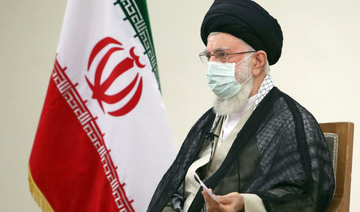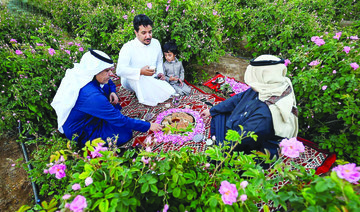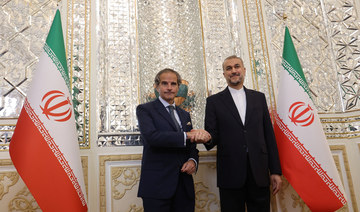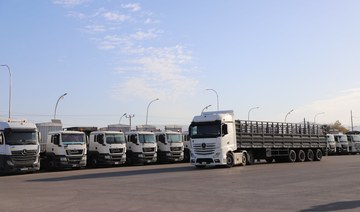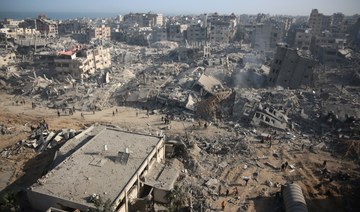TEHRAN: Iran says it will impose a six-day-long “general lockdown” in cities across the country after being hit by what it describes as its fifth wave of the COVID-19 pandemic, state media reported Saturday.
The lockdown includes all bazars, markets and public offices, as well as movie theaters, gyms and restaurants in all Iranian cities.
The lockdown will begin on Monday and will last through Saturday.
The national coronavirus taskforce, which issued the decision, also ordered a travel ban between all Iranian cities from Sunday to Friday.
Also on Saturday, Iran reported 466 deaths and 29,700 new cases of coronavirus patients in a single day. That brought the total pandemic death toll to 97,208, and total confirmed cases to 4,389,085.
Last week, Iran hit a record in both its single-day death toll and confirmed new cases of COVID-19, with 42,541 new coronavirus cases and a daily death toll of 588.
Iran is struggling to vaccinate its people against the pandemic. Like much of the world, it remains far behind countries like the United States in vaccinations, with only 3.8 million of its more than 80 million people having received both vaccine doses.
Many front-line medical workers have been vaccinated with Iran’s locally produced shots, or the Chinese state-backed Sinopharm vaccine that may be less effective than other inoculations.
Iran’s government announced that its homemade vaccine provides 85 percent protection from the coronavirus, without disclosing data or details. Iran also imports Russia’s Sputnik V vaccine, as well as the Oxford-AstraZeneca shot through the United Nations-backed COVAX program.
So far, authorities have avoided imposing heavy-handed rules on a population badly equipped to bear them. Iran, which has suffered the worst virus outbreak in the region, is reeling from a series of crises: tough US sanctions, global isolation, a heat wave, the worst blackouts in recent memory and ongoing protests over water and electricity shortages.
Iran’s Supreme Leader Ayatollah Ali Khamenei, who has final say on all state matters, in January slammed shut any possibility of American or British vaccines entering the country, calling them “forbidden.”
For now, the majority of Iranians receiving vaccines rely on foreign-made shots. A health ministry spokesman said that Iran could import Western vaccines “as long as they’re not produced in the US or Britain.”
Iran will impose 6-day ‘general lockdown’ over coronavirus
https://arab.news/6sub6
Iran will impose 6-day ‘general lockdown’ over coronavirus
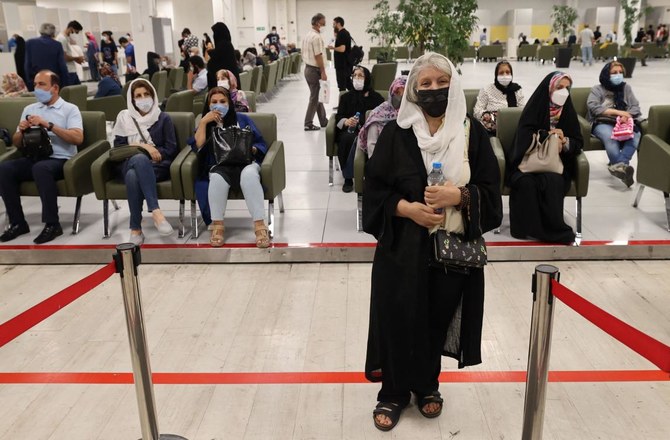
- The lockdown will begin on Monday and will last through Saturday
- On Satruday, Iran reported 466 deaths and 29,700 new cases of coronavirus patients in a single day
Ex-PM Khan party reiterates call for judicial probe into May 2023 violence in Pakistan
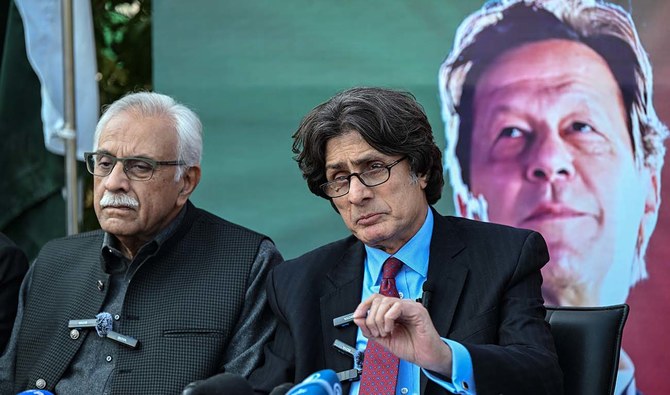
- Khan’s brief arrest on May 9, 2023 saw hundreds of his supporters allegedly ransack state buildings and vandalize public property
- A Pakistani military spokesman on Tuesday said it was important to punish May 9 perpetrators to restore trust in the justice system
ISLAMABAD: Jailed former prime minister Imran Khan’s Pakistan Tehreek-e-Insaf (PTI) opposition party on Tuesday reiterated its call for a judicial probe into violent protests that hit Pakistan on May 9, 2023 over Khan’s brief arrest in a graft case.
Khan’s arrest saw hundreds of his supporters allegedly pour into the streets across the country, ransacking military and other properties. Thousands were arrested in the aftermath and some were tried by military courts after the authorities promised to bring the perpetrators and instigators of the violence to justice.
The PTI says the May 9 incident was a “false flag operation” and the subsequent crackdown was aimed at keeping Khan, who was ousted from power in a parliamentary no-trust vote in April 2022, and his party from returning to power in Pakistan’s national election held in February this year, after being delayed for months.
Asked about the claims, a Pakistani military spokesman said on Tuesday the May 9 incident was not related to the military alone, but to the whole of Pakistan, noting that the protesters had attacked military installations, burnt the residence of the founder of Pakistan and vandalized martyrs’ monuments.
The spokesman, Maj-Gen Ahmed Sharif Chaudhry, said the perpetrators and facilitators of the riots needed to be brought to justice as per the constitution and law of the land to preserve the credibility and faith in the country’s justice system.
“See, all this what he has said, we challenge him on these things that all what he is saying, its proofs should be brought before the people,” Raoof Hasan, the PTI information secretary, said at a press conference.
“And the easiest way for that is, what we started demanding immediately after May 9, that an independent, transparent judicial inquiry be instituted, which established who committed the crime and who were behind them.”
Last week, the PTI also issued a circular and urged party members to hold rallies in every provincial assembly constituency to commemorate the May 9 protests, citing directives from Khan who has been in jail since August last year.
Khan, 71, was ousted in 2022 after falling out with Pakistan’s powerful military leaders who many say backed him into power in 2018. In opposition, he waged an unprecedented campaign of defiance against the military establishment which has directly ruled the South Asian nation for nearly half of its history.
Arguably Pakistan’s most popular politician, Khan says the cases against him are “politically motivated,” aimed at keeping him from returning to power. The military denies it.
All is rosy in Taif as fans flock to flower festival
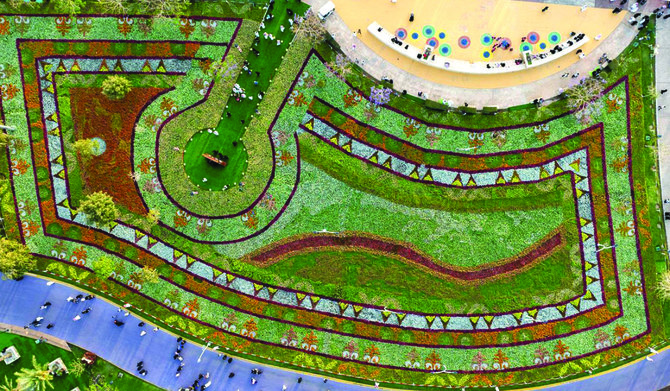
- Taif’s annual show features a floral carpet of over million flowers
- Farmers, vendors optimistic about increase in sales at the event
JEDDAH: Visitors are flocking to the 19th Taif Rose Festival at Al-Raddaf Park where the flowers are in full bloom, highlighting the region’s rich floral heritage.
The festival, themed “Qetaf” meaning “Picking Time,” coincides with the harvest season and will run until May 12. The organizers include the Taif Rose Cooperative Society and Taif Municipality.
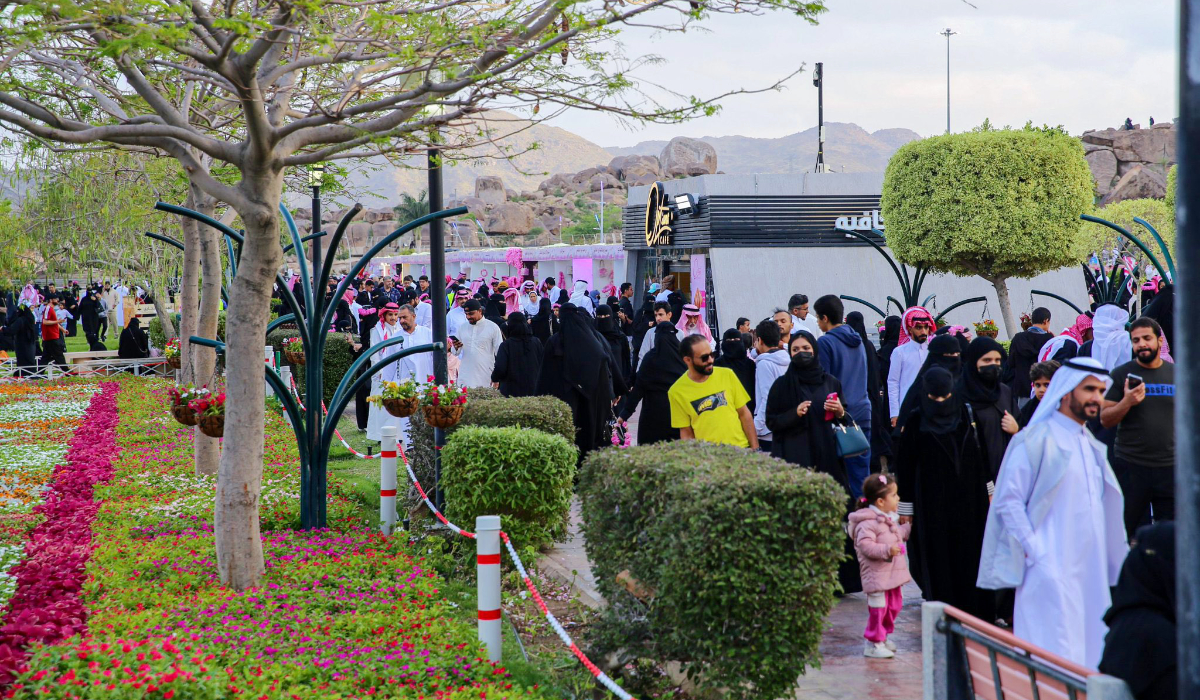
There has been an impressive turnout of Taif residents and domestic and international tourists. The exhibitors — mostly farmers and vendors — are optimistic that increased revenues will help boost rose cultivation and production.
Abdullah Altwairqi, a local farmer and festival participant, said: “Participating in the Taif Rose Festival has become a tradition for me. The atmosphere improves each year, and the revenue and exposure we receive from visitors make it worthwhile.”
HIGHLIGHTS
• Exhibitors at the Taif Rose Festival are optimistic that increased revenues will help boost rose cultivation and production.
• The flower carpet set up by the municipality in the center of the park was designed with decorative patterns inspired by the province’s heritage.
• It covers 5,206 square meters and was crafted using over a million flower and rose seedlings, making it the largest in the history of the festival.
At his booth, Altwairqi showcased various flowers and fruit, including Taif roses, peaches, prickly pears, figs, mulberries, grapes, blackberries, pomegranates, as well as aromatic plants.

Altwairqi urged people to visit the Rose Flavor cafe where they can savor hot and cold beverages infused with the flavor of Taif roses and other aromatic flowers including lavender, which is also abundant in the region.
The flower carpet set up by the municipality in the center of the park left visitors awestruck. Covering 5,206 square meters, it was crafted using over a million flower and rose seedlings, making it the largest in the history of the festival.

Faiz Al-Thibaiti, director-general of media and corporate communication at Taif Municipality, told Arab News: “The flower carpet was designed with decorative patterns inspired by the province’s heritage.”
He said the carpet has ensured the event has become “one of the most important tourism festivals in the Kingdom, attracting thousands of visitors and tourists from various regions of the country.”
NUMBER
70k
The rose-picking season in Taif starts around the end of March or early April, lasting between 35 to 45 days, with an average of 70,000 roses picked daily.
The decorations adorning the flower carpet draw inspiration from the intricate designs found on the walls and facades of Taif’s ancient structures, including Al-Kaki Palace in Al-Salama and King Saud Palace.

Al-Thibaiti added: “Preparations for the festival started early, with the Taif Rose Cooperative Society detailing participation criteria to highlight Taif roses, including their cultivation, harvesting, and distillation into fine perfumes. This adds to Taif’s unique tourist appeal. The festival provides a platform for producers, experts, and entrepreneurs to connect, collaborate, and boost this important sector.”
Among the highlights are the rose and flower path, product stalls, goods market, government booths, and the agricultural nursery.
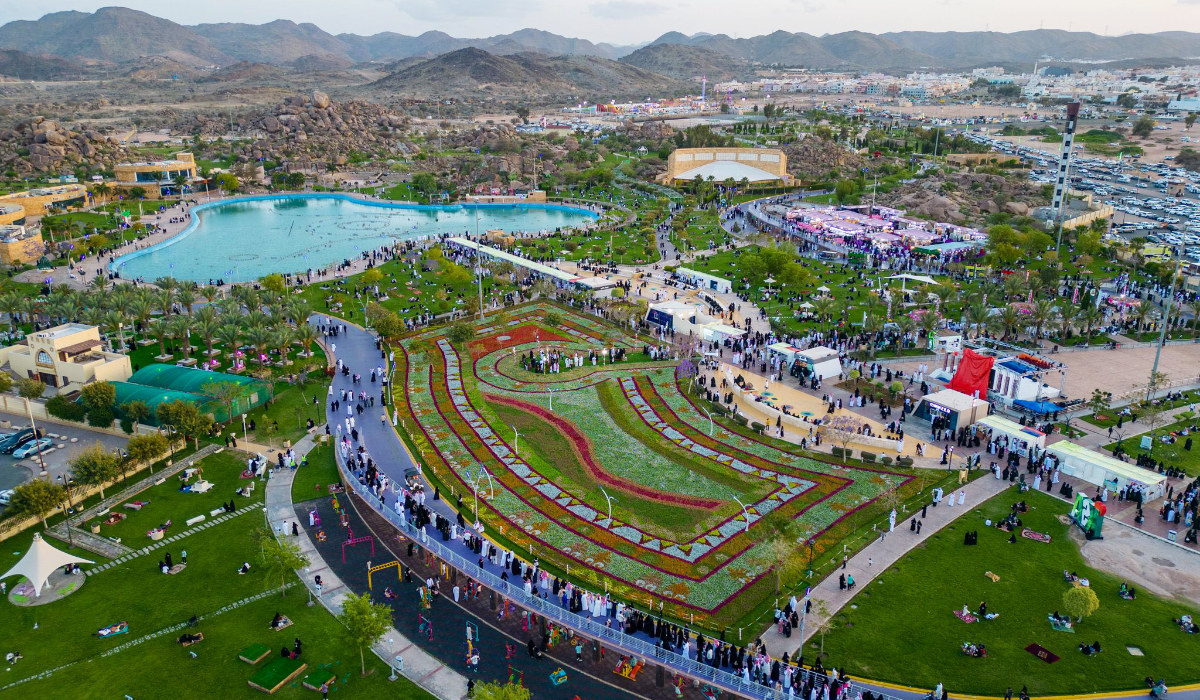
Interactive fountain shows accompanied by national tunes were also among the attractions, with a crossing to the upper pedestrian bridge from where visitors can view the massive flower carpet.
Artwork, flower arrangements, and hanging floral baskets scattered throughout the park added to the flair of the event.
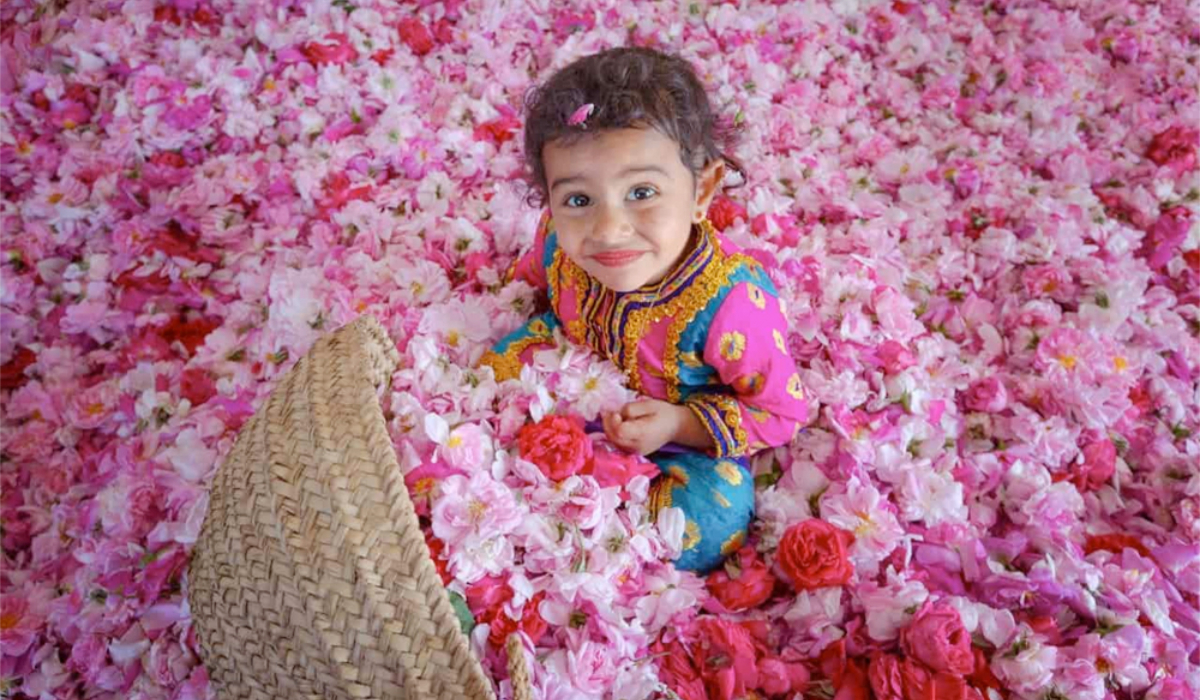
Al-Thibaiti said: “The significant turnout at the current festival comes amid increasing rose production year after year, indicating the success of this agricultural sector in achieving high revenues while continuing to promote the Taif rose product.”
Taifrosethon
The five-day Taifrosethon began on May 7, which is being held to encourage entrepreneurship in the region with technological solutions to enrich the industry.
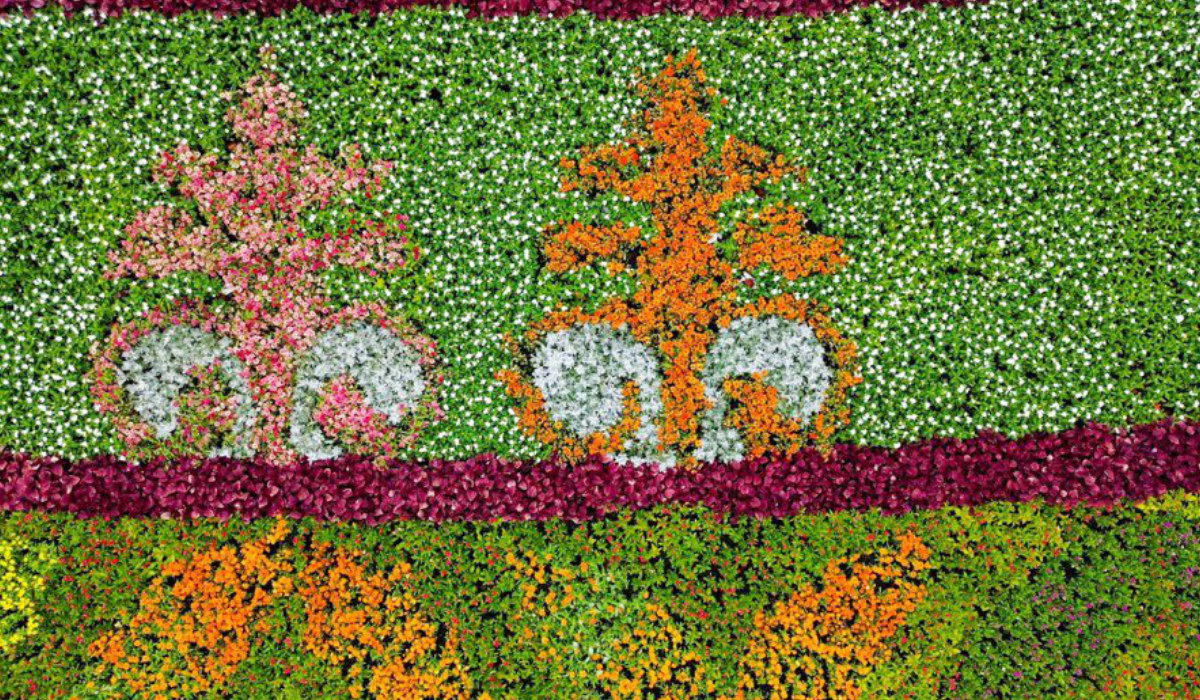
The event includes various skills training and technical workshops covering trade, cultural heritage, and tourism.
The top-three winners will receive $2,666, $1,866 and $1,333 respectively. Participants are required to enter as teams, each with three to five members.
Taif’s roses
The Taif province produces more than 200 million roses each season. According to the local chamber of industry, each tree produces an average of 250 roses daily throughout the harvest season, which lasts for about 45 days.
The rose-picking season starts around the end of March or early April, lasting between 35 to 45 days, with an average of 70,000 roses picked daily.
Taif roses feature an exquisite, sweet fragrance and vibrant pink hues on delicate petals, and are a hallmark of the region’s natural beauty.
Cultivated in the high-altitude climate of Taif, these roses thrive in the cool temperatures and fertile soil of the region.
They are meticulously harvested by hand to preserve their quality, with the petals carefully collected for various purposes.
UN atomic chief urges Iran to take ‘concrete’ steps for cooperation
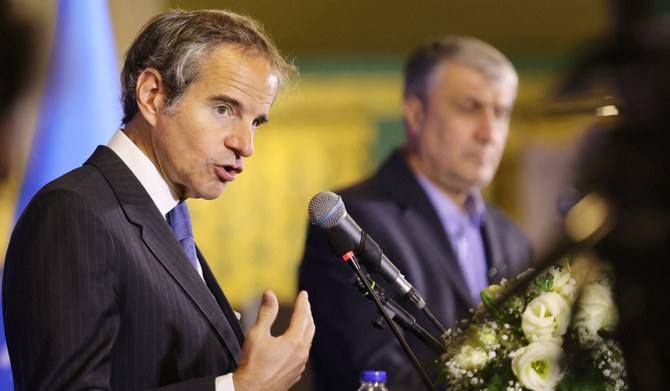
- Grossi said a March 2023 deal with Iran was “still valid” but required more “substance”
ISFAHAN: UN atomic watchdog chief Rafael Grossi, visiting Iran on Tuesday, urged the country to adopt “concrete” measures to bolster cooperation on its nuclear program and address the international community’s concerns.
At a news conference in the city of Isfahan, Grossi said he had proposed in talks with Iranian officials that they “focus on the very concrete, very practical and tangible measures that can be implemented in order to accelerate” cooperation.
The International Atomic Energy Agency director-general held talks with senior Iranian officials including Atomic Energy Organization’s head Mohammad Eslami.
Grossi insisted on the need to “settle differences” on the nuclear issue while the Middle East was going through “difficult times,” particularly with the war between Israel and the Iran-backed Palestinian militant group Hamas in the Gaza Strip.
“Sometimes, political conditions pose obstacles to full-fledged cooperation” between Iran and the international community, he said.
To overcome these obstacles, he said, “we need to come up with concrete steps that are going to be helpful in bringing us closer to these solutions that we all need.”
Grossi said a March 2023 deal with Iran was “still valid” but required more “substance.”
The agreement was reached during Grossi’s last visit to Iran and outlined basic cooperation measures including on safeguards and monitoring. The IAEA chief said, however, that there had been a “slowdown” in the agreement’s implementation including the number of inspections being reduced and the accreditation of a group of IAEA experts being withdrawn by Iran.
Iran suspended its compliance with caps on nuclear activities set by a landmark 2015 deal with major powers a year after the US in 2018 unilaterally withdrew from the agreement and reimposed sweeping sanctions.
“We have this legal right to reduce our commitments when the other parties do not adhere to their obligations,” Eslami said during the joint news conference.
Tensions between Iran and the IAEA have repeatedly flared since the deal fell apart, and EU-mediated efforts have so far failed both to bring Washington back on board and to get Tehran to again comply with the terms of the accord.
The agency has in recent months criticized Iran for a lack of cooperation on issues including the expansion of its nuclear work, the barring of inspectors and deactivating the agency’s monitoring devices at its nuclear facilities.
Why Israel’s military operation in Rafah will lead to ‘inevitable catastrophe’ in Gaza
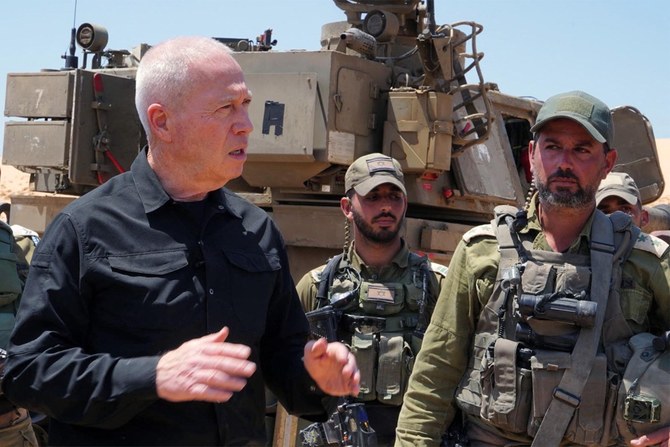
- Israel has seized control of the Rafah border crossing and ordered 100,000 Palestinians to “evacuate immediately”
- Full-scale assault on Rafah would intensify humanitarian emergency throughout Gaza, aid agencies warn
LONDON: Palestinians in Gaza’s southern governorate of Rafah face a desperate situation as the Israeli military proceeds with its long-planned assault on the area, capturing the Gaza side of the border crossing with Egypt and ordering displaced families to move yet again.
The Israeli army announced on Tuesday morning that its 401st Brigade had taken “operational control” of the Rafah border crossing after advancing into the eastern part during the night as part of its mission to dislodge Hamas.
Earlier on Monday, Israel ordered some 100,000 Palestinians in eastern Rafah to “evacuate immediately” to Al-Mawasi, a coastal town near Khan Younis that humanitarian organizations said was “completely uninhabitable.”
Mercy Corps said Palestinians in eastern Rafah were confronted with two impossible choices: Face death under bombardment or attempt a perilous journey to an unlivable area with no access to essential aid.

Bushra Khalidi, advocacy director for Oxfam in the Palestinian territories, says civilians fleeing Rafah have been left with nowhere to go.
She told Arab News that people in Rafah “are worried of even leaving their homes” because they fear they will not find anywhere in the middle area or in Al-Mawasi.
According to the AFP news agency, more than 74 percent of the infrastructure in Gaza has been destroyed since Oct. 7 when Israel launched its bombing campaign in retaliation for the Hamas-led attack on southern Israel.
Al-Mawasi, which Israel had dubbed a “humanitarian zone,” is “already overpopulated and filled with makeshift tents,” said Khalidi. “There is no infrastructure, there (are) no services, and no facilities to host this number of (internally displaced people).”
Moreover, this narrow coastal strip, measuring just 1 km wide and 14 km long, already hosts an estimated 250,000 displaced Gazans, according to the Palestinian Red Crescent.
Ahmed Bayram, media adviser for the Norwegian Refugee Council in the Middle East, stressed that “there is not a corner or a street in Gaza where people can go expecting safety.”
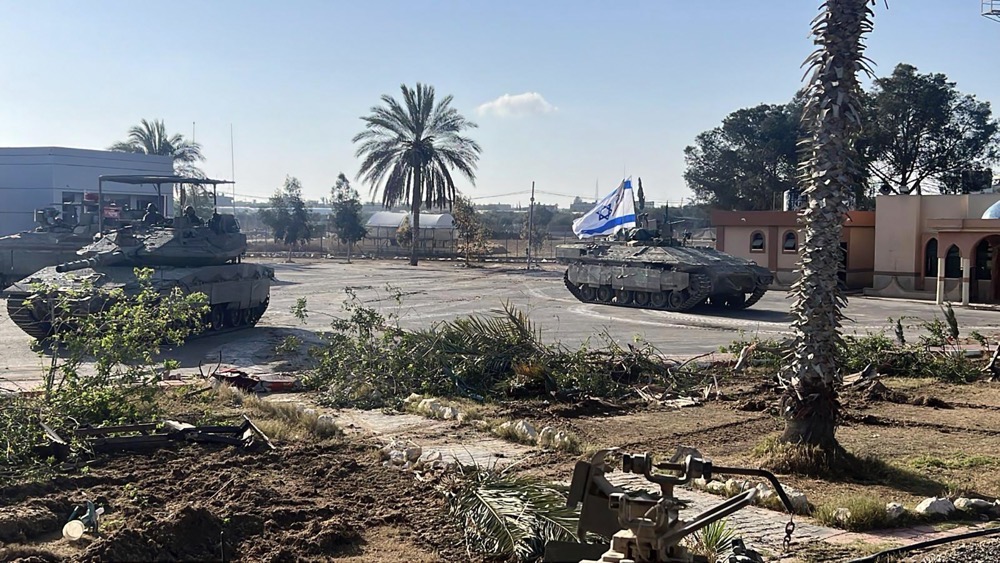
He told Arab News: “Al-Mawasi, which is one of the areas Israel has asked people to go to, is full to the very brim. There is no free spot left in that narrow stretch of land, which is not equipped for such high demand.”
According to Mercy Corps, Al-Mawasi is already a sea of makeshift tents, with little in the way of humanitarian relief, electricity, or water.
It also remains unclear whether Palestinians can flee to neighboring countries through the Rafah crossing now that it is under Israeli control, said Ruth James, Oxfam’s regional humanitarian coordinator for the Middle East and North Africa.
She told Arab News: “Many Palestinians in Gaza currently do not have the recognized right to return to their original homes. Given this context, Egypt, or any other state, should be cautious of inadvertently abetting any potential efforts by Israel, or any other party, to ethnically cleanse the Palestinian population of Gaza.”
Volker Turk, the UN human rights chief, slammed Israel’s evacuation order as “inhumane,” warning that such an action could amount to a war crime, Reuters reported.
Oxfam’s Khalidi also warned that if a Rafah-wide incursion happens, which is the worst-case scenario, it would “entail mass carnage and a complete bloodbath.”
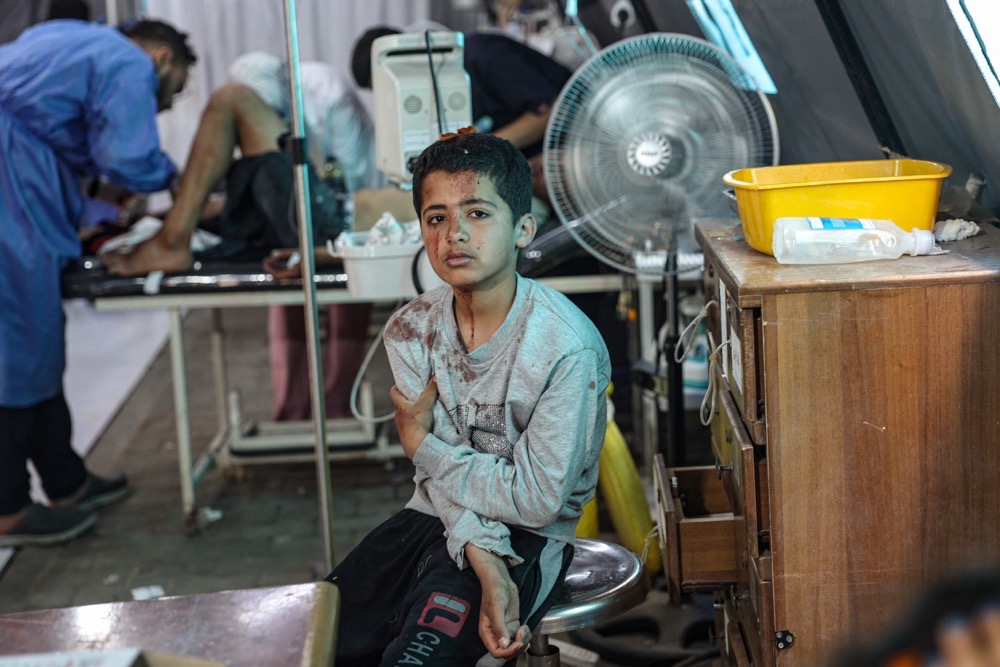
She explained that this is due to “how small” Rafah is and “because of how congested and overpopulated it is.”
Echoing her colleague’s fears, James said: “It’s hard to imagine the scale of need caused by a Rafah invasion. Simply put, this invasion can’t happen. There must be an immediate and permanent ceasefire.”
She added: “The alternative is an avoidable, massive loss of civilian life.”
Despite repeated public objections, even US President Joe Biden’s appeals against the Rafah offensive have gone unheeded.
According to the Associated Press, Biden urgently warned Israeli Prime Minister Benjamin Netanyahu in a phone call on Monday against invading Rafah, stressing it would only lead to more deaths and exacerbate the despair in the embattled enclave.
The Israeli military said its operation in Rafah is designed to eliminate fighters and dismantle infrastructure used by Hamas, according to Reuters.
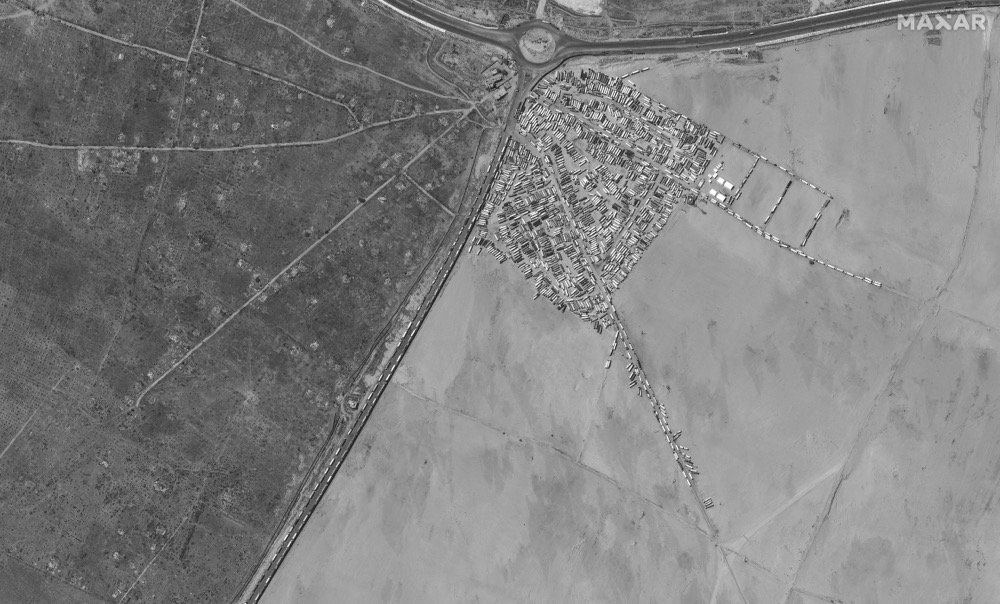
Israel’s overnight strikes across Rafah killed at least 23 people, including five children, according to local health officials.
Prior to that, Israeli warplanes pounded homes in Rafah, killing at least 27 Palestinians, including two babies, according to Gaza’s health authority.
This is despite Hamas accepting the terms of a Qatari-Egyptian ceasefire proposal on Monday.
Humanitarian organizations concur that the impact of Israel’s operation in Rafah will extend beyond the eastern area, affecting more than 1.4 million people who have been sheltering in the southern governorate — and the entirety of Gaza’s remaining population.
“While the initial ‘evacuation orders’ and operations announced in the east of Rafah are directly impacting 100,000 people, over 1.4 million are sheltering in Rafah, half of which are children, and are at direct risk of any escalated military operations across the area,” Salim Oweis, a spokesperson for UNICEF in Gaza, told Arab News.
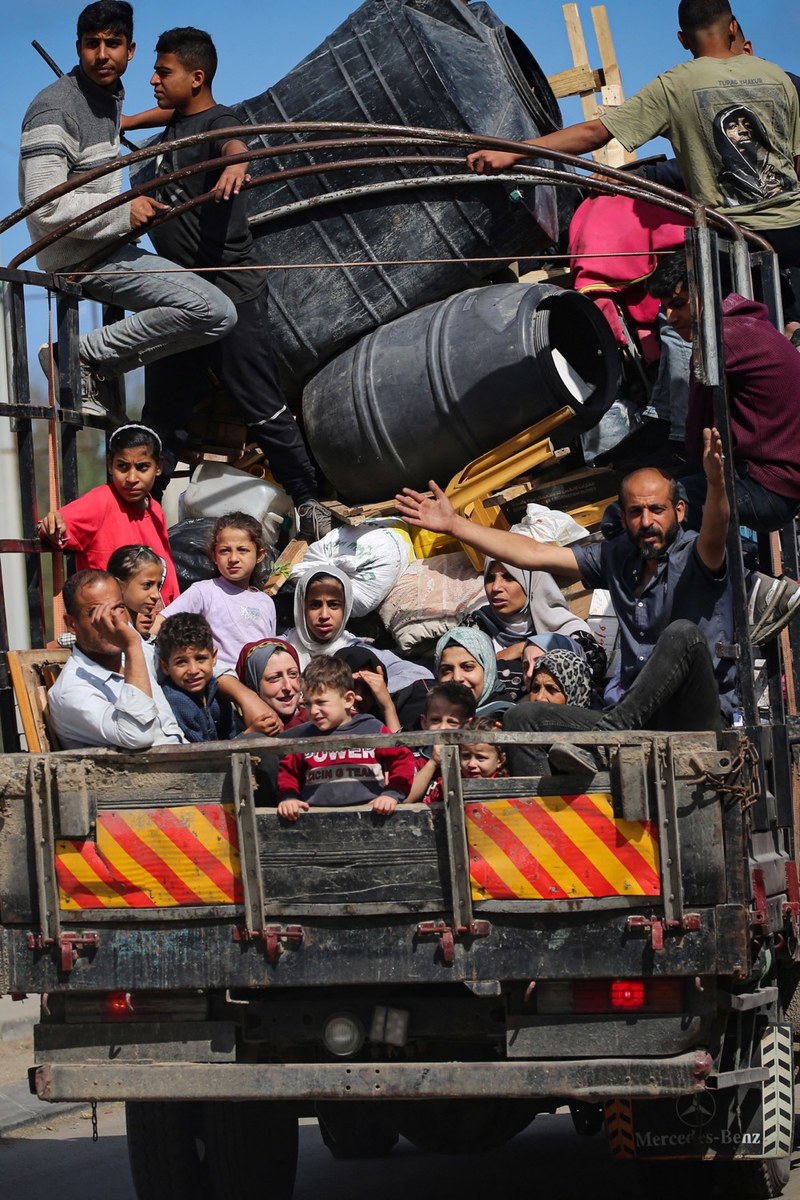
“The extended impact will be far-reaching to include all the 2.2 million residents of Gaza.”
Elaborating, Oweis added: “Rafah is the main hub of all humanitarian response, and any impact on the already struggling aid delivery and humanitarian response will hamper the efforts across Gaza.”
Rafah is the last population center in the Gaza Strip after the seven-month Israeli assault obliterated three-quarters of the besieged enclave, killing at least 34,700 Palestinians according to Gaza’s health ministry, and displacing 90 percent of the population of 2.3 million people.
Israel’s evacuation orders in eastern Rafah, coupled with unceasing airstrikes across Gaza’s south, have instilled panic among the war-weary residents, triggering an exodus of thousands of Palestinians who have nowhere to seek refuge.
Describing the situation across the Gaza Strip as “a state of despair, chaos and confusion” as Israel carries out its assault on Rafah, NRC’s Bayram said that “by issuing its orders, Israel has again pushed over 1 million people into the unknown.”
FASTFACTS
• Israel ordered Palestinians to evacuate to Al-Mawasi — deemed ‘completely uninhabitable.’
• Closing Rafah crossing would cut Gaza’s only viable humanitarian lifeline, warn aid chiefs.
• Fears that Rafah-wide incursion would ‘entail mass carnage and a complete bloodbath.’
He added: “Let’s not forget, while the orders cover an area with 100,000 people east of Rafah, the rest of the population in central and western areas will think they are next to be forcibly transferred, and so they will try to get out while they can.”
Tahani Mustafa, a senior Palestine analyst at the International Crisis Group, foresees a “horrific” humanitarian situation if the Rafah hostilities do not stop.
“All movement of people and goods has been closed off, at a time where famine is already in the north and was very much on the verge in the south,” she told Arab News.
“There’s been no contingency plan in place, and all foreign aid delegations have been evacuated. If this goes ahead as Israel states, it will be a massacre.”
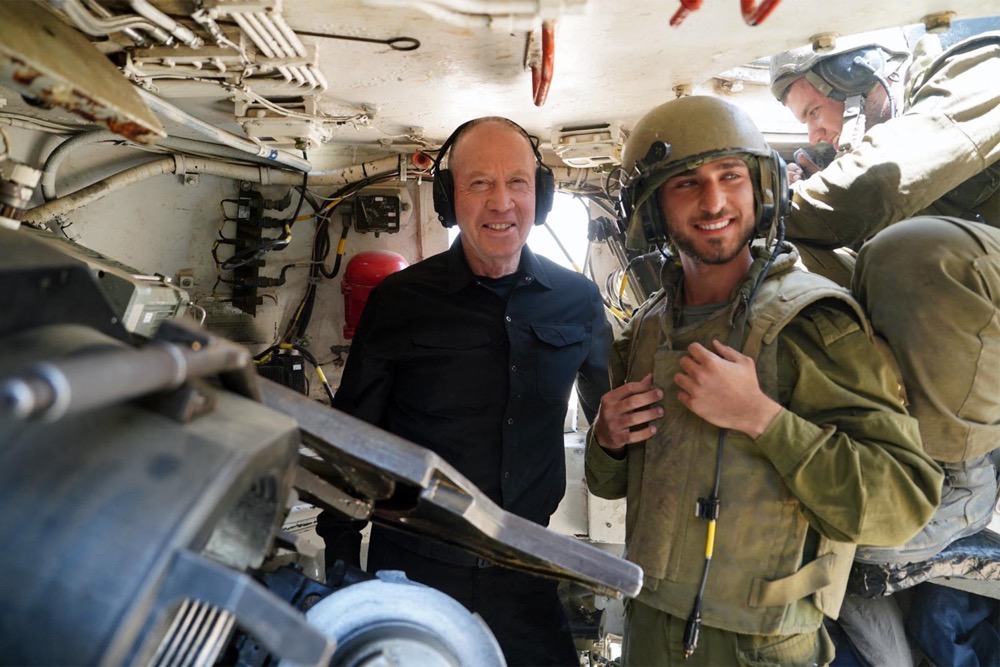
As Israel has blocked aid through the Rafah border crossing, aid groups are concerned about the impact on much-needed humanitarian assistance across the Gaza Strip. This concern is exacerbated by the suspension of aid deliveries to Gaza through the Kerem Shalom crossing following a nearby Hamas rocket attack.
Oxfam’s James cautioned that “even one day of closure (of crossing points) means that additional lives are likely to be lost to hunger and illness.”
She called on Israel to “adhere to its obligations under international humanitarian law to ensure civilian populations are provided with the most essential aid in sufficient quantities.”
Khalidi pointed out that aid organizations “are already facing huge obstructions” in delivering aid across Gaza.
“Often aid is not making it even past Khan Younis,” she said. “And hence the descent to hell, into starvation, that we have seen over the last course of months in the north, but also across the strip.”
Stressing the need to open “all crossings” to meet the immense and deep humanitarian needs in Gaza, Khalidi said: “We’re hearing that maybe other crossings will open, but the problem is that we already had two crossings open, and that was not enough.”

The World Food Programme warned on Saturday that northern Gaza is experiencing a “full-blown famine,” which is “moving its way south.”
Bayram of the NRC also warned that “the entire aid system is at the point of collapse.”
He said: “Closing down the Rafah crossing means cutting off the only viable lifeline currently available for aid workers,” highlighting that the NRC relies on the Rafah crossing to bring in essential aid.
“Fuel is running low already and the existing stocks will not be able to sustain increasing demand,” he added, stressing that “Israel must reverse its plans so we can avoid an inevitable catastrophe.”
UNICEF’s Oweis emphasized that “any interruption to the already limited aid access will have a devastating impact on the humanitarian situation as a whole.”
He added: “With no fuel coming in, all the basic services will be in jeopardy of a total halt, including aid delivery and what’s left of healthcare.
“Not having food entering the strip means that more children will fall into malnutrition and disease, and will be put at heightened risk of death.”

Gaza’s health authority reported on April 25 that since February, at least 28 children, most of them no older than 12 months, had died of malnutrition and dehydration.
Oweis stressed that “the only hope for a way out of a worsening humanitarian catastrophe is simple, and it’s an immediate and long-lasting humanitarian ceasefire.”
He added: “Meanwhile, safe and consistent access for humanitarian organizations and personnel to reach children and their families with lifesaving aid, wherever they are in the Gaza Strip, is crucial.”

Israel’s incursion into Rafah putting 1.5m people in danger: WHO director
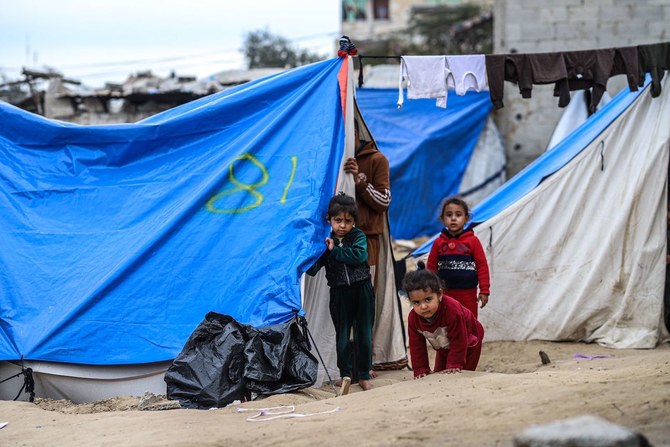
- Hospitals in Rafah must be protected and provided with the supplies they need to keep providing care to the thousands of sick and injured civilians, Balkhy said
LONDON: Israel’s military incursion into the Gazan city of Rafah is putting 1.5 million people, including 600,000 children, in “grave danger,” a World Health Organization official warned on Tuesday.
Dr. Hanan Balkhy, regional director for the Eastern Mediterranean, said on X that lives were hanging in the balance as the health system in the Gaza Strip struggled to remain functional.
The WHO and its partners were committed to providing assistance and delivering aid to all areas of the Gaza Strip, she said, but that required unimpeded access through the Rafah border crossing.
She called for the urgent reopening of the crossing and said any further escalation would push an already fragile humanitarian operation “to a breaking point.”
Hospitals in Rafah must be protected and provided with the supplies they need to keep providing care to the thousands of sick and injured civilians who were the victims of Israeli military operations, Balkhy said.
She called on the international community to pressure Israel to stop its military operation, which is threatening the lives of hundreds of thousands of Palestinian civilians in Rafah.
“An urgent ceasefire in Gaza is needed now, for humanity’s sake,” she said.
Israeli forces seized the main border crossing between Egypt and southern Gaza on Tuesday, shutting down a vital aid route into the Palestinian enclave that was already on the brink of famine.




